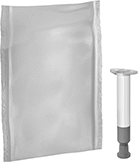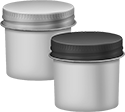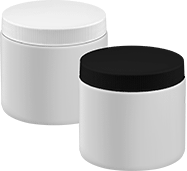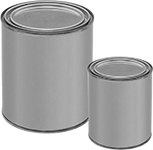About Structural Adhesives
More
About Paint and Protective Coatings
More
Conductive Adhesives for Electronics
An alternative to solder, these flexible, silver-filled adhesives accommodate joint movement. Use them to bond electrical components and repair circuits.
Epoxy adhesives are two-part adhesives that need to be mixed together. The size listed is the combined total of the two parts.
Thermoplastic adhesives are one-part adhesives that don’t need to be mixed. Dry to the touch and faster and easier to apply than two-part adhesives, they’re best for use on automated assembly lines. Often used to join solar cells in solar panels, these adhesives make instant electrical connections without flux at lower temperatures than soldering. Since they attach to solar cells with heat and slight pressure, they limit stress cracks that can form when soldering. These adhesives can also be used as a bridge between multiple solar panels.
Adhesives that meet ASTM E595, a standard used by NASA, produce almost no volatile emissions that could damage sensitive electronics, even in a vacuum.



Container | ||||||||||||||
|---|---|---|---|---|---|---|---|---|---|---|---|---|---|---|
| Mfr. Model No. | Size, fl. oz. | Net Weight, oz. | Type | Surface Resistivity, ohms-cm | Begins to Harden | Reaches Full Strength | Thermal Conductivity, W/m-K | Mix Ratio | Consistency | Max. Temp., °F | Specifications Met | For Joining | Each | |
Loctite® Adhesives | ||||||||||||||
| 2902 | __ | 0.09 | One-Time-Use Packet, Syringe | 1 × 10-3 | 60 min. | 24 hrs. | 2.99 | 100:6 | Paste | 230° | ASTM E595 | Ceramic, Glass, Metal | 00000000 | 000000 |
| 2902 | __ | 0.35 | One-Time-Use Packet, Syringe | 1 × 10-3 | 60 min. | 24 hrs. | 2.99 | 100:6 | Paste | 230° | ASTM E595 | Ceramic, Glass, Metal | 00000000 | 000000 |
Adhesives | ||||||||||||||
| __ | __ | 0.09 | One-Time-Use Packet | 5 × 10-2 | 3 hrs. | 24 hrs. | 1.55 | 1:1.15 | Paste | 230° | __ | Ceramic, Glass, Metal | 0000000 | 00000 |
| __ | 0.5 | __ | Can | 4 × 10-4 | 4 hrs. | 5 days | 7.93 | 1:1 | Paste | 265° | __ | Metal | 0000000 | 000000 |
| __ | 0.5 | __ | Can | 9 × 10-5 | 4 hrs. | 5 days | 7.9 | 1:1 | Paste | 175° | ASTM E595 | Ceramic, Glass, Metal | 00000000 | 000000 |
| __ | 1 | __ | Can | 4 × 10-4 | 4 hrs. | 5 days | 7.93 | 1:1 | Paste | 265° | __ | Metal | 0000000 | 000000 |
| __ | 1 | __ | Can | 9 × 10-5 | 4 hrs. | 5 days | 7.9 | 1:1 | Paste | 175° | ASTM E595 | Ceramic, Glass, Metal | 00000000 | 000000 |

| Lg. | Wd. | Thick. | Melting Temp., °F | Max. Temp., °F | Surface Resistivity, ohms-cm | Begins to Harden | Reaches Full Strength | Thermal Conductivity, W/m-K | Consistency | For Joining | Each | |
Strip with Adhesive on One Side | ||||||||||||
|---|---|---|---|---|---|---|---|---|---|---|---|---|
| 12" | 1/16" | 0.002" | 250° | 300° | 1 × 10-4 | 5 sec. | 5 sec. | 12 | Film | Metal | 00000000 | 00000 |
Conductive Glue-on-a-Roll

Attach EMI/RFI shields and gaskets to electronics housings—these rolls are loaded with conductive fibers. Also known as adhesive transfer tape, they have a thin film of pressure-sensitive glue on a peel-away liner. Unlike screws, they won’t leave gaps for EMI to get in. They’re also more conformable than tape with adhesive on both sides.
Conductive Surface Fillers for Electronics


A high silver content allows these surface fillers to conduct electricity and heat. Use them to fill gaps and rebuild missing material on electrical connections or to assemble new components. They come as two parts. The size listed is the combined total of the two parts.
Volume resistivity measures how well a material opposes the flow of electricity. The lower the rating, the more electricity it conducts.
Thermal conductivity measures a material’s ability to transfer heat. The higher the rating, the more heat it transfers.
Container | Temp. Range, °F | ||||||||||||
|---|---|---|---|---|---|---|---|---|---|---|---|---|---|
| Mfr. Model No. | Size, fl. oz. | Net Weight, oz. | Type | Begins to Harden | Reaches Full Strength | Thermal Conductivity, W/m-K | Volume Resistivity, ohms-cm | Mix Ratio | Min. | Max. | For Use On | Each | |
Loctite® Surface Fillers | |||||||||||||
| 3888 | __ | 0.09 | One-Time-Use Packet | 90 min. | 24 hrs. | 1.44 | 0.001 | 100:6 | -40° | 170° | Aluminum, Brass, Bronze, Copper, Steel, Stainless Steel, Titanium, Polycarbonate Plastic | 0000000 | 000000 |
Surface Fillers | |||||||||||||
| __ | __ | 0.09 | One-Time-Use Packet | 90 min. | 24 hrs. | 6.05 | 0.009 | 100:6 | -75° | 250° | Aluminum, Brass, Bronze, Copper, Steel, Stainless Steel, Titanium, Ceramic, Glass | 0000000 | 00000 |
| __ | __ | 0.35 | One-Time-Use Packet | 90 min. | 24 hrs. | 6.05 | 0.009 | 100:6 | -75° | 250° | Aluminum, Brass, Bronze, Copper, Steel, Stainless Steel, Titanium, Ceramic, Glass | 0000000 | 000000 |
| __ | 0.5 | __ | Jar | 4 hrs. | 5 days | 5.77 | 0.0004 | 1:1 | Not Rated | 300° | Aluminum, Brass, Copper, Steel, Stainless Steel | 0000000 | 000000 |
| __ | 1 | __ | Jar | 4 hrs. | 5 days | 5.77 | 0.0004 | 1:1 | Not Rated | 300° | Aluminum, Brass, Copper, Steel, Stainless Steel | 0000000 | 000000 |
Low-Outgassing Mounting Tape

Tested to meet ASTM E595, a standard used by NASA, this tape can mount sensitive electronics while releasing almost no volatile emissions that could damage them, even in a vacuum. Use it where temperatures fluctuate—its polyester backing keeps it from shrinking or stretching. And thanks to its acrylic adhesive, neither heat nor chemicals will cause it to peel off.
| Wd. | Lg., yd. | Overall Thick. | Material | Adhesive Location | Adhesive Type | Temperature Range, °F | Adhesion to Steel, oz./in. wd. | Specifications Met | Color | Each | |
3M 9495MP | |||||||||||
|---|---|---|---|---|---|---|---|---|---|---|---|
| 1" | 60 | 0.0057" | Polyester Plastic | Both Sides | Acrylic | -40° to 250° | 16 | ASTM E595 | Clear | 0000000 | 000000 |
Low-Outgassing Sealing Tape

Tested to meet ASTM E595, a standard used by NASA, this tape seals gaps while releasing almost no volatile emissions that could damage sensitive electronics, even in a vacuum. The Tedlar backing resists chemicals and wear. And thanks to its acrylic adhesive, this tape will stay put—even when exposed to pulling forces and solvents.
![]() Certificates with a traceable lot number and product shelf life are available for these products. Download certificates from ORDER HISTORY after your order ships.
Certificates with a traceable lot number and product shelf life are available for these products. Download certificates from ORDER HISTORY after your order ships.
| Wd. | Lg., ft. | Overall Thick. | Material | Adhesive Type | Temperature Range, °F | Tensile Strength, lbs./in. wd. | Adhesion to Steel, oz./in. wd. | Specifications Met | Color | Each | |
3M 838 | |||||||||||
|---|---|---|---|---|---|---|---|---|---|---|---|
| 1" | 216 | 0.004" | Tedlar PVF Plastic | Acrylic | -100° to 225° | 24 | 47 | ASTM E595 | White | 0000000 | 0000000 |
Low-Outgassing Conductive Aluminum Foil Electrical Tape

Tested to meet ASTM E595, a standard used by NASA, this tape gives off almost no volatile emissions that could damage sensitive electronics, even in a vacuum. It’s more conformable than copper tape, so you can cover textured housings and round cables without leaving gaps for electromagnetic interference (EMI) to get in. When EMI makes contact, the conductive backing and adhesive convert it into heat and actively reflect it away. The conductivity of this tape also makes it great for electrical connections. Use it on surfaces that can’t be soldered.
Low-Outgassing Conductive Copper Foil Electrical Tape

Tested to meet ASTM E595, a standard used by NASA, this tape releases almost no volatile emissions that could damage sensitive electronics, even in a vacuum. Use it to repair and prototype circuit boards and shield components from EMI/RFI. With a copper backing and conductive adhesive, it’s useful for making electrical connections—current travels both along and through the tape. Unlike aluminum tape, it can be soldered. It’s also better at resisting chemicals.
Heat-Transfer Mounting Tape

Use this tape to attach components to heat sinks and metal chassis walls in place of screws and other mechanical fasteners. It conducts heat away from sensitive electronics.
Aluminum foil tape conducts electricity. It also meets ASTM E595, a standard used by NASA, which means it produces almost no volatile emissions that could damage sensitive electronics, even in a high vacuum.
| Wd. | Lg. | Overall Thick. | Adhesive Location | Adhesive Type | Temp. Range, °F | Voltage Rating | Thermal Conductivity, W/m-K | Specifications Met | Color | Each | |
Aluminum Foil | |||||||||||
|---|---|---|---|---|---|---|---|---|---|---|---|
| 1/2" | 3ft. | 0.009" | Both Sides | Acrylic | -20° to 255° | Not Rated | 1.4 | ASTM E595 | Gray | 00000000 | 000000 |
| 1/2" | 12ft. | 0.009" | Both Sides | Acrylic | -20° to 255° | Not Rated | 1.4 | ASTM E595 | Gray | 00000000 | 000000 |
| 1" | 3ft. | 0.009" | Both Sides | Acrylic | -20° to 255° | Not Rated | 1.4 | ASTM E595 | Gray | 0000000 | 00000 |
| 1" | 12ft. | 0.009" | Both Sides | Acrylic | -20° to 255° | Not Rated | 1.4 | ASTM E595 | Gray | 0000000 | 000000 |
| 2" | 3ft. | 0.009" | Both Sides | Acrylic | -20° to 255° | Not Rated | 1.4 | ASTM E595 | Gray | 0000000 | 000000 |
| 2" | 12ft. | 0.009" | Both Sides | Acrylic | -20° to 255° | Not Rated | 1.4 | ASTM E595 | Gray | 0000000 | 000000 |
High-Shear Static Control Sealing Tape

The acrylic adhesive on this tape is so sticky that it won’t slide around even when cut. Backed with a metalized polyester, this tape minimizes the buildup and discharge of static electricity, so you can apply it to electronic parts. Tested to meet ASTM E595, a standard used by NASA, it gives off almost no volatile emissions that could damage sensitive electronics and optics, even in a vacuum. It’s often used in prototyping to temporarily join two parts that you’ll want to separate later. It removes cleanly from your parts, even after heat exposure.
| Wd. | Lg., ft. | Overall Thick. | Material | Adhesive Type | Temperature Range, °F | Tensile Strength, lbs./in. wd. | Adhesion to Steel, oz./in. wd. | Specifications Met | Color | Each | |
3M 8439 | |||||||||||
|---|---|---|---|---|---|---|---|---|---|---|---|
| 1" | 30 | 0.002" | Polyester Plastic | Acrylic | -60° to 300° | 29 | 44 | ASTM E595 | Silver | 00000000 | 000000 |
High-Strength Fiberglass Electrical Tape

Made with fiberglass for durability and abrasion resistance, this electrical-insulating tape also withstands high temperatures. The cloth can absorb electrical insulating varnishes.
Tape with acrylic adhesive is the best at conforming to irregularly shaped surfaces. It’s also the best choice for use around sensitive electronics. Compliant with the NASA-set ASTM E595 standard, it gives off almost no volatile emissions that could damage electronics, even in a high vacuum. It’s made without halogens, so it won’t produce toxic smoke if it catches fire, either. This tape resists solvents, so it won’t come off during cleaning.
| Wd. | Lg., ft. | Overall Thick. | Material | Temperature Range, °F | Dielectric Strength | Voltage Rating | Specifications Met | Color | Each | |
Acrylic Adhesive | ||||||||||
|---|---|---|---|---|---|---|---|---|---|---|
| 1/4" | 54 | 0.007" | Fiberglass Cloth | -20° to 350° | Not Rated | Not Rated | ASTM E595, MIL-A-A-59770, UL 510 | White | 0000000 | 000000 |
| 1/2" | 54 | 0.007" | Fiberglass Cloth | -20° to 350° | Not Rated | Not Rated | ASTM E595, MIL-A-A-59770, UL 510 | White | 0000000 | 00000 |
| 3/4" | 54 | 0.007" | Fiberglass Cloth | -20° to 350° | Not Rated | Not Rated | ASTM E595, MIL-A-A-59770, UL 510 | White | 0000000 | 00000 |
| 1" | 54 | 0.007" | Fiberglass Cloth | -20° to 350° | Not Rated | Not Rated | ASTM E595, MIL-A-A-59770, UL 510 | White | 0000000 | 00000 |
| 1 1/2" | 54 | 0.007" | Fiberglass Cloth | -20° to 350° | Not Rated | Not Rated | ASTM E595, MIL-A-A-59770, UL 510 | White | 0000000 | 00000 |
| 2" | 54 | 0.007" | Fiberglass Cloth | -20° to 350° | Not Rated | Not Rated | ASTM E595, MIL-A-A-59770, UL 510 | White | 0000000 | 00000 |
Masking Tape for Electronics

Use this tape to wrap and splice cables or to mask components while soldering. It dissipates heat and is an excellent electrical insulator.
Tape with acrylic adhesive resists solvents and chemicals, so it’s often used in labs. Tape that meets ASTM E595, a standard set by NASA, will produce almost no volatile emissions, even in a high vacuum. It's a great choice for use around your most sensitive electronics.
108 ft. | ||||||||
|---|---|---|---|---|---|---|---|---|
| Wd. | Overall Thick. | Temperature Range, °F | Voltage Rating | Dielectric Strength | Specifications Met | Color | Each | |
Acrylic Adhesive | ||||||||
Kapton® Polyimide Plastic | ||||||||
| 1/4" | 0.0025" | -20° to 350° | 7,000V | 2,800 V/mil | ASTM E595 | Amber | 0000000 | 000000 |
| 3/8" | 0.0025" | -20° to 350° | 7,000V | 2,800 V/mil | ASTM E595 | Amber | 0000000 | 00000 |
| 1/2" | 0.0025" | -20° to 350° | 7,000V | 2,800 V/mil | ASTM E595 | Amber | 0000000 | 00000 |
| 3/4" | 0.0025" | -20° to 350° | 7,000V | 2,800 V/mil | ASTM E595 | Amber | 0000000 | 00000 |
| 1" | 0.0025" | -20° to 350° | 7,000V | 2,800 V/mil | ASTM E595 | Amber | 0000000 | 00000 |
| 2" | 0.0025" | -20° to 350° | 7,000V | 2,800 V/mil | ASTM E595 | Amber | 0000000 | 000000 |
| 6" | 0.0025" | -20° to 350° | 7,000V | 2,800 V/mil | ASTM E595 | Amber | 0000000 | 000000 |
Heavy Duty EMI/RFI Shielding Coatings for Electronics

Coat electronics for durability in tough conditions while blocking EMI/RFI signals. Made of epoxy mixed with silver-coated copper, these coatings are stronger than acrylic EMI/RFI coatings. They are rigid enough to withstand the wear of access panels and industrial cabinets. You can also use them in engine compartments because they resist damage from high temperatures and chemicals. Also known as conductive paint, they shield your parts from interference that could cause circuit malfunction and data loss. Mix the two parts of these compounds together and paint them on components. These coatings cannot be sold to Canada due to product labeling requirements.
Dry Time | ||||||||||||
|---|---|---|---|---|---|---|---|---|---|---|---|---|
| Container Size, fl. oz. | Consistency | Touch, min. | Overall, hrs. | Interference Reduction @ Frequency | Surface Resistivity | Temperature Range, °F | Heating Requirements to Reach Full Strength | For Use On | Color | Cannot Be Sold To | Each | |
| 27 | Thin Liquid | 5 | 4 | 55 dB @ 1 GHz | 0.31 ohms/sq. | -40° to 245° | 4 hrs. @ 150° F | Aluminum, Steel, Stainless Steel, Ceramic, Glass, Plastic, Chrome, Galvanized Steel | Brown | Canada | 0000000 | 0000000 |

























